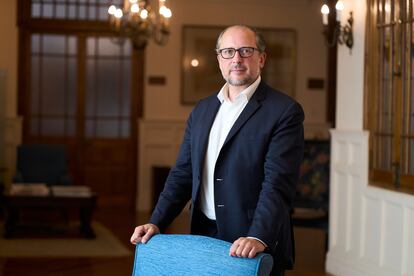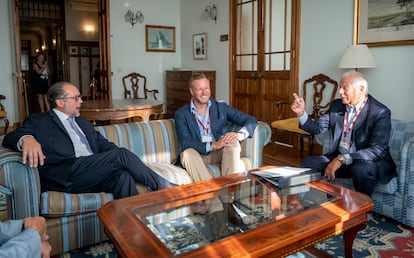Austria’s Foreign Minister: ‘Russia has the capacity to interfere in the Balkans’
Conservative Alexander Schallenberg defends his country’s military neutrality in the Ukrainian war and expresses concern about the possibility of Moscow taking advantage of the loopholes left by the EU

Austria’s Minister of Foreign Affairs, Alexander Schallenberg, 54, is visiting Spain at the invitation of Josep Borrell, the European Union’s High Representative for Foreign Affairs. A lawyer trained at the University of Innsbruck with experience in the diplomatic service, he is also a former Chancellor (he served between October 11 and December 6, 2021, after fellow member of Austrian People’s Party (ÖVP) Sebastian Kurz, resigned amid a corruption case). This week, Schallenberg participated with the leader of European diplomacy in a round table focused on the foreign policy challenges of the European Union, Quo Vadis Europa?, organized by the Menéndez Pelayo International University in Santander, Spain.
“What is valid for Ukraine is valid for the Balkans,” the conservative ÖVP politician argued in one of his speeches. “Russia has the capacity to interfere in the Balkans,” he later added in a telephone conversation with EL PAÍS.
Question. Austria is a neutral country and not a member of NATO. That means that it does not provide military assistance to Ukraine.
Answer. Austria’s neutrality is constitutional, and the majority of citizens support it. Moreover, we are neutral militarily, but not in terms of values. When the war started, Josep [Borrell] told me that he was going to activate the European Defense Mechanism. I told him there was no problem: I contribute [with] a constructive abstention. That way we don’t prevent our partners from moving forward. And we do collaborate with humanitarian aid: the Austrian government [has] provided about €150 million [$161,932,500] to Ukraine, but if we include everything, between public and private contributions, the figure is between €600 ($647,730,000) and €800 million.
Q. There are Austrian parties that oppose any kind of aid to Kiev; one of them is the far-right Freedom Party (FPÖ), which is leading in the polls for the next elections.
A. This situation is not unique to Austria: we have this kind of debate between government and opposition in many countries, in Spain as well, I think. Some polls put the FPÖ in the lead, but we still have more than a year to go until the elections. We have lived through difficult times, with a pandemic and then a war 500 kilometers [about 310 miles] from Vienna; however, the Austrian government has dealt with all this. We are optimistic. Look at the results in [the last elections in] Spain.
Q. You describe it as the European Union’s responsibility to ensure that the Balkan countries remain linked to the European family. Has there been some sort of displacement?
A. Europe is responsible for its neighborhood, and even more so when these countries are located in the heart of our territory. It cannot be that 20 years after the accessions began, none of them is part of the EU [referring to Albania, Serbia, Bosnia-Herzegovina, North Macedonia and Montenegro]. It is very disappointing. When the European Union incorporated Greece in 1981, it was probably not able to implement all the economic rules. It was done to safeguard a young democracy. Something similar happened in 1986 with Spain and Portugal: our lifestyle was being extended. Obstacles had to be overcome, but five years later, Spain was part of the European Community. That has not happened with the Balkans.

Q. What are the consequences of this situation?
A. We run the risk of creating a political vacuum that will be replaced by another model. That is why exporting stability and security to the Balkans must be a geostrategic interest for the EU. Otherwise, we run the risk of importing instability and insecurity. The solution is contained in the European Council’s latest conclusions: horizontal integration. Until now, it was total integration. There was no middle ground. That is the wrong approach: the same problem is happening with Ukraine and Moldova, as it will take years to negotiate accession.
Q. Are you worried about Putin’s influence in the Balkans?
A. Russia has the ability to interfere in the Balkans: it uses fake news and disinformation to instigate against Europeans and Americans. Moscow can generate a crisis. And the Balkans are a volatile region: there is complexity in Bosnia-Herzegovina; there has been instability in Montenegro, and problems between Kosovo and Serbia as well. The more present we are, the less opportunity there is for others to interfere. The Western Balkans are a geostrategic test for the European Union.
Q. Another challenge has emerged in Africa with the convulsions in the Sahel.
A. European soft power in Africa is much less than we thought. After Mali and Burkina Faso, we see that it is extremely dangerous because of its economic, security, and migration consequences. Last year, Austria had the highest number of asylum seekers per capita on the entire European continent. We are surrounded by sovereign states—some [of which are] EU members—and we had 112,000 asylum applications [in 2022]. What is happening in Niger is an African problem and there must be an African solution, but we must contribute to finding that solution.
Q. Do European relations with the Global South need to be reformulated?
A. In general, we can do much better. We should talk to these countries, understand them, instead of moralizing or lecturing. At the political level, we could have a better articulated EU strategy. Most European foreign ministers travel to the same countries—Senegal, South Africa, sometimes Rwanda—leaving many others forgotten. The same is true in Latin America. We can do better by coordinating. Moreover, we cannot take the Global South for granted. Now, countries like China offer their own solutions and we have to compete with [them], as well as with Russia’s narratives. We have been losing ground to them.
Q. Austria has just banned TikTok on official cell phones, following in the footsteps of other countries like the U.S. Does the Chinese social media platform represent an international problem?
A. We take very seriously the reports about TikTok and the information that is collected through these services. That is the big difference between private companies in democracies and their behavior in autocratic systems. In the latter, there is no firewall between the company and the state. Personally, I do not use social media.
Sign up for our weekly newsletter to get more English-language news coverage from EL PAÍS USA Edition
Tu suscripción se está usando en otro dispositivo
¿Quieres añadir otro usuario a tu suscripción?
Si continúas leyendo en este dispositivo, no se podrá leer en el otro.
FlechaTu suscripción se está usando en otro dispositivo y solo puedes acceder a EL PAÍS desde un dispositivo a la vez.
Si quieres compartir tu cuenta, cambia tu suscripción a la modalidad Premium, así podrás añadir otro usuario. Cada uno accederá con su propia cuenta de email, lo que os permitirá personalizar vuestra experiencia en EL PAÍS.
¿Tienes una suscripción de empresa? Accede aquí para contratar más cuentas.
En el caso de no saber quién está usando tu cuenta, te recomendamos cambiar tu contraseña aquí.
Si decides continuar compartiendo tu cuenta, este mensaje se mostrará en tu dispositivo y en el de la otra persona que está usando tu cuenta de forma indefinida, afectando a tu experiencia de lectura. Puedes consultar aquí los términos y condiciones de la suscripción digital.









































